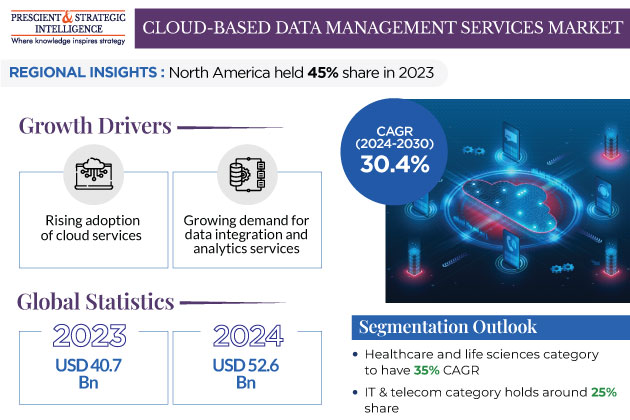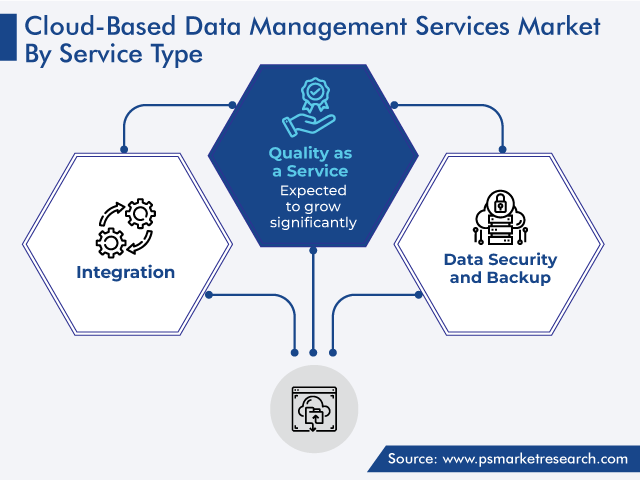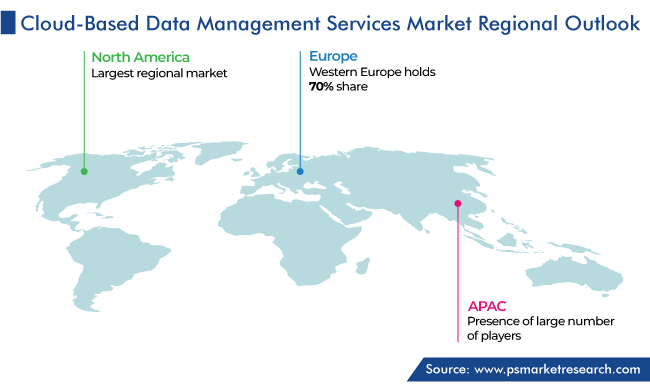Report Code: 12907 | Available Format: PDF | Pages: 210
Cloud-Based Data Management Services Market Share Report by Service Type (Integration, Data security and Backup, Quality as a Service), Service Model (Software as a Service, Platform as a Service, Infrastructure as a Service), Deployment Mode (Public Cloud, Private Cloud), Vertical (BFSI, IT & Telecom, Retail & Consumer Goods, Government & Public Sector, Energy & Utilities, Manufacturing, Healthcare & Life Sciences, Education, Media & Entertainment, Research & Consulting Services) - Global Industry Demand Forecast to 2030
- Report Code: 12907
- Available Format: PDF
- Pages: 210
- Report Description
- Table of Contents
- Market Segmentation
- Request Free Sample
Cloud Based Data Management Services Market Size & Share
The cloud-based data management services market valued USD 40.7 billion in 2023, and it is expected to witness a CAGR of 30.4% during 2024–2030, reaching USD 258.4 billion by 2030. It is attributed to the rising adoption of cloud services and the need for cost-efficiency, remote work, digital banking, data backup, disaster recovery, scalability, accessibility, and flexibility among businesses. Additionally, the growing demand for data integration and analytics services is adding fuel to the growth of the market.

Growing Adoption of Cloud-Based Services Is Driving Market
Cloud-based services are offered on the internet that allow individuals and businesses to manage, store, and analyze large volumes of data. Services include data integration, warehousing, and management, machine learning, and artificial intelligence. These services provide users the flexibility to access computer resources from any place and a secure platform for storing confidential information. These services enable quick deployments and decreased capital and maintenance costs. Additionally, they provide organizations more dynamism, which is essential considering the constantly changing demands of every industry.
- Easy integration, safety, backup, and Scalability are the primary features of cloud-based services.
- Organizations nowadays require data conversion, integration, migration, Master Data Management (MDM), data synchronization, data virtualization, data exchange, and service-oriented architectures (SOAs).
- Data protection, archiving, data, and recovery demands are addressed by data security and backup services.
- Digital information cleaning, updating, scrubbing, standardization, remediation, and de-duplication come under quality as a service.
Numerous companies are adopting cloud storage services across the world. The freedom for lots of people to use these services concurrently at work is an important driver for the market expansion. Cloud providers manage all aspects of these services from deployment and data storage to cybersecurity and regular updates. The cloud allows for the real-time updation of a company’s workflows for all the parties who have access to that specific software, application, or database.
- It allows various users to get the common document, without impeding other users in their assignment.
- The same document can be utilized progressively by various users from anywhere.
- Moreover, it does not affect the tasks other users already have.
- One of the fundamental benefits of cloud-based information is information synchronization.
- With the proper credentials, a user can access a document stored on a third-party database with any internet-connected gadget.
The market is also growing due to the increasing demand for data security and compliance with rules such as the General Data Protection Regulation (GDPR). Moreover, organizations are being aware of the utility of cloud-based solutions in protecting their data. Additionally, the market has an enormous room for expansion due to the increasing need for on-demand analytics and data integration services. Further, the growing trend of digital transformation in many industries, such as healthcare and BFSI, fuels the market growth.
Quality as a Service Category To Have Significant CAGR
Based on service type, the quality as a service (QaaS) category will have a CAGR of 35% from 2024 to 2030.
- QaaS includes performance testing, functional testing, usability testing, security testing, and quality assurance, which are provided to developers and businesses.
- This approach ensures the reliability of software on multiple devices and platforms, improves user experiences, as well as enhances product quality.
Additionally, automation and AI technologies are being integrated into QaaS to streamline testing procedures, expand test coverage, and better identify potential issues. AI-driven testing instruments can inspect huge volumes of data to predict imperfections and redesign testing procedures. QaaS providers also ensure consistency with industry standards, thus offering secure testing conditions and ensuring data insurance and grouping.
- As organizations focus on the enhancement of their offerings, QaaS demand is poised to grow further.
- Being able to access testing assets and capabilities over the internet gives organizations the agility and ability to maintain a high quality in their products and services.

Software as a Service Holds Largest Market Share
Based on service model, SaaS has the largest share, of 55%, due to the significant advantages it provides for businesses. The increasing utilization of SaaS in data management services has been responsible for a substantial portion of this growth.
Leading companies, such as Salesforce and Microsoft SkyBlue, have seen significant increases in their cloud-based information demand. Salesforce's SaaS-based customer relationship management (CRM) solution saw a 26% year-over-year income expansion in the last financial quarter. Similarly, Microsoft SkyBlue's SaaS offerings for data analytics and storage saw a 36% rise in sales revenue over the same period.
- SaaS eliminates the need for on-premises computer server installation and enables users to access tools and services from any device with an internet connection.
- SaaS arrangements are, in many cases, adaptable, thus empowering organizations to upscale or downscale their storage as per their necessities without any problem.
- Without causing any disruptions, this adaptability accommodates expanding or shifting business requirements.
- Businesses save money in the beginning with SaaS's subscription-based business model.
- Paying for IT resources on a repetitive model enables the creation of a better spending plan and takes away the spending on equipment, support, and updates.
SaaS applications can be easily integrated with other programs or applications, thus cultivating interoperability and work process productivity. These applications can also be immediately shared, thus decreasing delays and permitting organizations to begin utilizing applications quickly.
SaaS suppliers handle updates, support, and security fixes as the demand arises, guaranteeing the most-recent tools to clients without the need for manual updates. The approach focuses on client experience, thereby offering instinctive connection points, customization choices, and client service and improving convenience and satisfaction. Therefore, SaaS arrangements have a wide market reach among organizations of all sizes across geographies.
- SaaS models are gaining popularity due to the growing demand for software solutions that are adaptable, cost-effective, and accessible.
- They are often created with development and flexibility to changing business necessities in mind.
Healthcare and Life Sciences Vertical To Have Highest CAGR
The healthcare and life sciences category is expected to grow at a CAGR of 35% from 2024 to 2030. Organizations in this industry use the cloud to safely store, access, and see patient information, clinical advances, therapy plans, and other patient data. Moreover, the advantages of cloud-based EHR systems include centralized storage, real-time accessibility, and seamless doctor–patient–payer collaboration. The secure sharing of patient information among various departments and healthcare facilities is made possible by the cloud, thus resulting in improved patient outcomes and coordinated care.
- Cloud-based clinical decision support system (CDSS) offers constant bits of knowledge to medical experts, such as patient data, distinguishing disease patterns, and giving tested suggestions at the place of care.
- Not only does this approach support individualized treatment plans but also improves diagnostic accuracy.
- The versatility of cloud solutions empowers medical care associations to effectively deal with the growing volume of clinical information.
- This guarantees that the CDSS can persistently advance and adjust to consolidate the most-recent medical research and best practices.
The growing investments in healthcare infrastructure, research and development, and the adoption of advanced medical technologies drive the market growth in this category. The Coronavirus pandemic sped up technological advancements, driven telehealth adoption, and prompted antibody improvement, thereby catalyzing development in the medical services and life sciences area.
- The high incidence of chronic diseases requires progressive approaches, thus driving the interest in enhanced diagnostic, therapeutic, and preventive measures.
- The expanding scope of R&D to address the unmet clinical requirements and foster advancement in medicine drive the adoption of cloud-based services in the healthcare sector.
- The need for pharmaceuticals and healthcare services is also fueled by the aging population in many regions, which is driving the demand for more-holistic care.
- Governments and regulatory bodies support medical technology development, for which many have implemented quicker drug and healthcare device approval processes.
| Report Attribute | Details |
Market Size in 2023 |
USD 40.7 Billion |
Market Size in 2024 |
USD 52.6 Billion |
Revenue Forecast in 2030 |
USD 258.4 Billion |
Growth Rate |
30.4% CAGR |
Historical Years |
2017-2023 |
Forecast Years |
2024-2030 |
Report Scope |
Market Trends, Drivers, and Restraints; Revenue Estimation and Forecast; Segmentation Analysis; Impact of COVID-19; Companies’ Strategic Developments; Market Share Analysis of Key Players; Company Profiling |
Segments Covered |
By Type; By Model; By Deployment Mode; By Vertical; By Region |
Explore more about this report - Request free sample
IT & Telecom Category Holds Second-Largest Market
The IT & telecom category holds the second-largest market share, of 25%. The rise of the cloud has been a vital factor in the development of the IT & telecom industry. Cloud innovation permits broadcast communications suppliers to proficiently store and share media with consumers. It also has the potential to cut down on the amount of software and hardware that must be installed and maintained. IT & media are also able to reduce the risk of losing or damaging delicate information by storing it on the cloud. Hence, for more-efficient data management, organizations are looking for hybrid cloud solutions.
North America Holds Largest Market Share
North America is the largest, with a share of 45% in 2023.
- The key reasons for the region’s dominance on the market are its robust economic growth and established infrastructure.
- The region’s market also profits from a wide range of industries, including BFSI, R&D, medical services, and construction.
- ICT assumed a critical part in North America's recent GDP growth.
- The region has an evolving media communications framework, massive usage rated for the internet, and the will to rapidly embrace advancements in all technologies.
- Moreover, 5G networks are being deployed to improve network availability and encourage the usage of data-intensive applications in a mass scale.

Competitive Analysis
The market's competitive examination uncovers a scene molded by vigorous R&D initiatives in the field of information technology. In a dynamic landscape characterized by evolving technologies, key players and niche innovators are engaged in stiff competition.
Recent Developments
- In September 2023, IBM upgraded its cloud security and compliance center to deliver modern cloud security and compliance solutions, to manage risks and protect data.
- In June 2023, NetApp improved its Blue XP product, which offers streamlined backup, recovery, data protection, and compatibility procedures.
- In November 2022, Dell Technologies improved its Dell Power Safeguard Chief and Dell Power Protect Data Manager Appliance.
- In September 2022, InPhySec, a cybersecurity company based in New Zealand, was acquired by Fujitsu to expand its security service portfolio.
- In June 2022, HPE Green Lake deployed several enhancements in its cloud services and launched eight new HPE Green Lake cloud services.
Top Providers of Cloud-Based Data Management Services Are:
- IBM Corporation
- Fujitsu Limited
- Cisco Systems Inc.
- Dell Technologies Inc.
- Hewlett Packard Enterprise (HPE) Company
- NetApp Inc.
- Informatica LLC
- SAS Institute Inc.
- Actian Corporation
- Oracle Corporation
- SAP SE
- Amazon Web Services Inc
Market Breakdown
This fully customizable report gives a detailed analysis of the cloud based data management services market from 2017 to 2030, based on all the relevant segments and geographies.
Segment Analysis, By Service Type
- Integration
- Data security and Backup
- Quality as a Service
Segment Analysis, By Service Model
- Software as a Service
- Platform as a Service
- Infrastructure as a Service
Segment Analysis, By Deployment Mode
- Public Cloud
- Private Cloud
Segment Analysis, By Vertical
- BFSI
- IT & Telecom
- Retail & Consumer Goods
- Government & Public Sector
- Energy & Utilities
- Manufacturing
- Healthcare & Life Sciences
- Education
- Media & Entertainment
- Research & Consulting Services
Region/Countries Reviewed for this Report
- North America
- U.S.
- Canada
- Europe
- Germany
- U.K.
- France
- Italy
- Spain
- Asia-Pacific
- Japan
- China
- India
- South Korea
- Australia
- Latin America
- Brazil
- Mexico
- Middle East and Africa
- Saudi Arabia
- South Africa
- U.A.E.
Explore
The industry for cloud-based data management services will reach USD 52.6 billion in 2024.
The cloud-based data management services market value will reach USD 258.4 billion in 2030.
The North American market for cloud-based data management services is the largest.
The rising acceptance of cloud-based services is the major cloud-based data management services industry driver.
Software as a Service hold the larger cloud-based data management services market share.
The cloud-based data management services industry is observing high competition between major players and niche innovators.
Want a report tailored exactly to your business strategy?
Request CustomizationWant an insight-rich discussion with the report author?
Speak to AnalystOur dedication to providing the most-accurate market information has earned us verification by Dun & Bradstreet (D&B). We strive for quality checking of the highest level to enable data-driven decision making for you
Our insights into the minutest levels of the markets, including the latest trends and competitive landscape, give you all the answers you need to take your business to new heights
With 24/7 research support, we ensure that the wheels of your business never stop turning. Don’t let time stand in your way. Get all your queries answered with a simple phone call or email, as and when required
We take a cautious approach to protecting your personal and confidential information. Trust is the strongest bond that connects us and our clients, and trust we build by complying with all international and domestic data protection and privacy laws